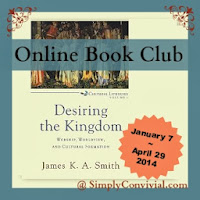We are pressing forward into Chapter 3 of
Desiring the Kingdom. If you want to hear what others are thinking check out the posts at
Simply Convivial.
Well this chapter is designed to push buttons - he says as much multiple times. He did push some of mine. In this chapter he looks at secular liturgies to help unveil their implicit but often unseen messages:
It is primarily this educative (i.e. formative) aspect of secular liturgies that concerns us here, precisely because so often the telos implicit in these pedagogies is antithetical to the Biblical vision of the kingdom of God.
He explores the mall (consumerism), the "military-entertainment complex" and the university as secular liturgies.
Consumerism
His exploration of consumerism is detailed but not new. This "underbelly" of consumerism has been discussed in many contexts - how it brings out our lack but fails to ultimately fulfill, how it requires a spend and throw away culture, how it uses others and creates comparisons and divisions. It is nice to have a neat and tidy argument though. I have been reading more about the simplify movement and I would say that it tries to help people stop the hamster wheel of consumption and set up a different way of living. I am still trying to dismount the hamster wheel (sometimes).
Military- Entertainment Complex
The next area he tackles is a combination that I have never heard before - the military-entertainment complex. Here, is where I know he has received a lot of criticism. In this section he focuses on how formative practices like the pledge of allegiance and the singing of the national anthem at sports events and the portrayal of war in movies draws us into worship of the state. Although he does mention that these are not state sponsored activities (unlike some other nations - did you watch Russia's Olympic opening?), he claims that they still call us to an allegiance that is not true to the vision of the church.
Honestly, I have my issues with his assessment, but it did help me to better understand some of my friend's thinking on the issue of the state. I do think that the relationship of the Christian to the state is changing in our time as the state pursues policies that are clearly set against Christian teachings. We did live in a country that was primarily founded on Judeo- Christian beliefs and I think we are living the unraveling of that foundation. That is not the argument he is making, but I think it is what will help more Christians separate being a citizen of the United States from being a Christian. I think his opinion is probably that we never live up to the phrase "justice for all" and are foolish to believe that we have. I think striving for a national ideal, albeit imperfect, is worth calling people into.
He claims that there is a "long legacy of Christians not identifying with any fatherland other than Christ." I was a little surprised by this argument. We are a people created for a place and some of the oldest works (think The Odyssey) are about fighting for the homeland and wanting to return home. This is a secular example; but, doesn't God promise a physical space to the Israelites and didn't they fight for it? I understand that the nation state, as such, is a newer idea - but the idea of being tied to a homeland and a place is an OLD thought. Part of being embodied is having a home.
I was also a little surprised by his attack on the military because defending the state is one of the items explicitly outlined in scripture for a king or by extension government to do. I don't think that loving your country is by definition set against loving God, as he seems to want to argue. It also made me think of Bonhoeffer, who returned to his home country because of his ties to the people and his love of Christ. Love of Christ being first. I am a little surprised at how black and white he makes this section when he seems to nuance so many other things. Maybe it is for effect and to jolt us out of our typical patterns.
University
The third area he explores is the university. I am a little surprised that he didn't talk more about it's history since it used to be a sacred liturgy - theology was the primary study of universities at one point - thus "uni". I greatly enjoyed learning more about the university while reading Russell Kirk's
Roots of American Order. I do believe that his analysis of "freshman week" is appropriate. One of the large state universities near us is famous for their "fish week". In college, the campus ministry that I was a part of basically tried to counter what frats and others offered with six weeks of alternative activities. It was very effective and I was glad for it. The university I attended intentionally tried to develop community in its dorms so you were required to live on campus for 3 years (we had relatively wonderful housing as a result). I don't think that anyone is unaware of the role that relationships and experiences - outside the classroom - play in college. I think that's one of the items that makes online universities struggle because it is hard to recreate that sense of community. This is also why college hunting is so important to people.
I do believe that college will significantly change in the next 15 years. I still might seek out some type of formative community experience for my children at that age though (
Mandala or
Rivendell Community, I am sure there are more and it is an area that should be explored further). The Christian community I developed at my basically secular college has meant so much to me. There is a reason campus ministry makes a huge difference. Have you ever attended
Urbana, the missions conference that Intervarsity puts on every three years? Literally thousands of young people being challenged to think about world missions and the role they might play.
The denomination that we are a part of is BRILLIANT in this regard. They are the only denomination, that I know of, that intentionally sponsors campus ministry as an outreach from their
national office. During these formative years they create a national network of young people grounded in fellowship and truth through conferences and shared experiences (like other college ministries). The difference is because the ministry is tied to a specific local church the college students engage in the life of the WHOLE body. We have 4 students that currently help us teach the 2 yos and it is a win for everyone! When they leave college they know that they are part of a larger body and have been engaged in that throughout college - not separated off somewhere. They also have friends around the country who are part of that fellowship and wherever they move they might have a local church that they can attend and find a friend.
I do think that his analysis is stretching and it made me ponder a few things in a different light. He is an academic which makes his writing style much less approachable. You can't just hand off this chapter to a friend and look for conversation - for most people you would have to help translate what he is saying. Thus the need for multiple chapters before he gets to the point.
In the next few chapters he says we are going to observe our own liturgies as a church. I am looking forward to this.





